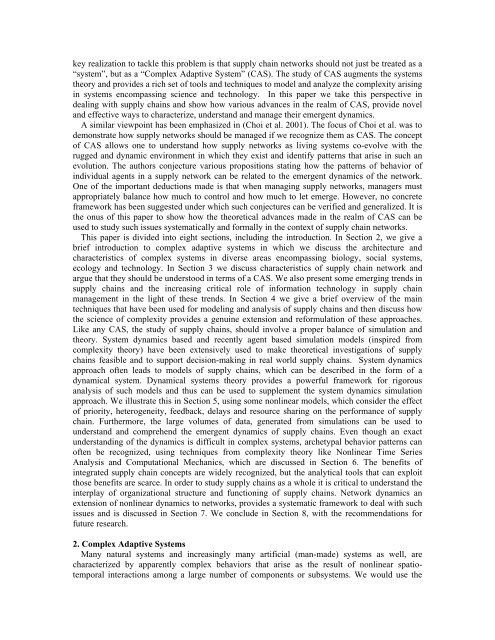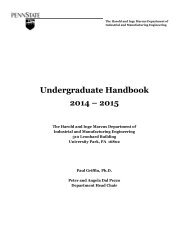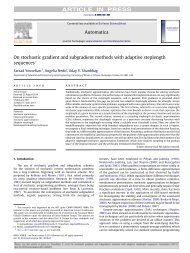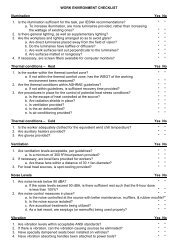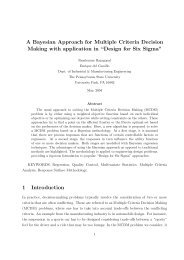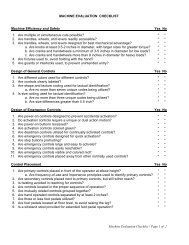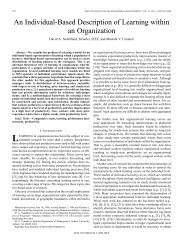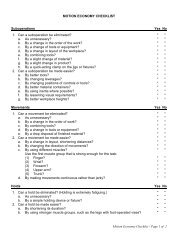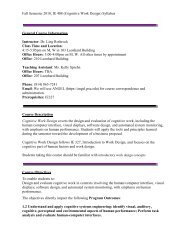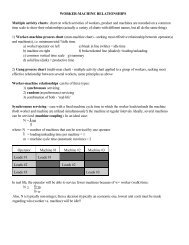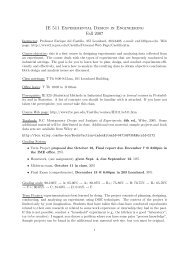DARPA ULTRALOG Final Report - Industrial and Manufacturing ...
DARPA ULTRALOG Final Report - Industrial and Manufacturing ...
DARPA ULTRALOG Final Report - Industrial and Manufacturing ...
Create successful ePaper yourself
Turn your PDF publications into a flip-book with our unique Google optimized e-Paper software.
key realization to tackle this problem is that supply chain networks should not just be treated as a<br />
“system”, but as a “Complex Adaptive System” (CAS). The study of CAS augments the systems<br />
theory <strong>and</strong> provides a rich set of tools <strong>and</strong> techniques to model <strong>and</strong> analyze the complexity arising<br />
in systems encompassing science <strong>and</strong> technology. In this paper we take this perspective in<br />
dealing with supply chains <strong>and</strong> show how various advances in the realm of CAS, provide novel<br />
<strong>and</strong> effective ways to characterize, underst<strong>and</strong> <strong>and</strong> manage their emergent dynamics.<br />
A similar viewpoint has been emphasized in (Choi et al. 2001). The focus of Choi et al. was to<br />
demonstrate how supply networks should be managed if we recognize them as CAS. The concept<br />
of CAS allows one to underst<strong>and</strong> how supply networks as living systems co-evolve with the<br />
rugged <strong>and</strong> dynamic environment in which they exist <strong>and</strong> identify patterns that arise in such an<br />
evolution. The authors conjecture various propositions stating how the patterns of behavior of<br />
individual agents in a supply network can be related to the emergent dynamics of the network.<br />
One of the important deductions made is that when managing supply networks, managers must<br />
appropriately balance how much to control <strong>and</strong> how much to let emerge. However, no concrete<br />
framework has been suggested under which such conjectures can be verified <strong>and</strong> generalized. It is<br />
the onus of this paper to show how the theoretical advances made in the realm of CAS can be<br />
used to study such issues systematically <strong>and</strong> formally in the context of supply chain networks.<br />
This paper is divided into eight sections, including the introduction. In Section 2, we give a<br />
brief introduction to complex adaptive systems in which we discuss the architecture <strong>and</strong><br />
characteristics of complex systems in diverse areas encompassing biology, social systems,<br />
ecology <strong>and</strong> technology. In Section 3 we discuss characteristics of supply chain network <strong>and</strong><br />
argue that they should be understood in terms of a CAS. We also present some emerging trends in<br />
supply chains <strong>and</strong> the increasing critical role of information technology in supply chain<br />
management in the light of these trends. In Section 4 we give a brief overview of the main<br />
techniques that have been used for modeling <strong>and</strong> analysis of supply chains <strong>and</strong> then discuss how<br />
the science of complexity provides a genuine extension <strong>and</strong> reformulation of these approaches.<br />
Like any CAS, the study of supply chains, should involve a proper balance of simulation <strong>and</strong><br />
theory. System dynamics based <strong>and</strong> recently agent based simulation models (inspired from<br />
complexity theory) have been extensively used to make theoretical investigations of supply<br />
chains feasible <strong>and</strong> to support decision-making in real world supply chains. System dynamics<br />
approach often leads to models of supply chains, which can be described in the form of a<br />
dynamical system. Dynamical systems theory provides a powerful framework for rigorous<br />
analysis of such models <strong>and</strong> thus can be used to supplement the system dynamics simulation<br />
approach. We illustrate this in Section 5, using some nonlinear models, which consider the effect<br />
of priority, heterogeneity, feedback, delays <strong>and</strong> resource sharing on the performance of supply<br />
chain. Furthermore, the large volumes of data, generated from simulations can be used to<br />
underst<strong>and</strong> <strong>and</strong> comprehend the emergent dynamics of supply chains. Even though an exact<br />
underst<strong>and</strong>ing of the dynamics is difficult in complex systems, archetypal behavior patterns can<br />
often be recognized, using techniques from complexity theory like Nonlinear Time Series<br />
Analysis <strong>and</strong> Computational Mechanics, which are discussed in Section 6. The benefits of<br />
integrated supply chain concepts are widely recognized, but the analytical tools that can exploit<br />
those benefits are scarce. In order to study supply chains as a whole it is critical to underst<strong>and</strong> the<br />
interplay of organizational structure <strong>and</strong> functioning of supply chains. Network dynamics an<br />
extension of nonlinear dynamics to networks, provides a systematic framework to deal with such<br />
issues <strong>and</strong> is discussed in Section 7. We conclude in Section 8, with the recommendations for<br />
future research.<br />
2. Complex Adaptive Systems<br />
Many natural systems <strong>and</strong> increasingly many artificial (man-made) systems as well, are<br />
characterized by apparently complex behaviors that arise as the result of nonlinear spatiotemporal<br />
interactions among a large number of components or subsystems. We would use the


